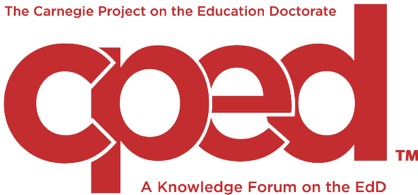Carnegie Project on the Education Doctorate Recognition
 The Ed.D. programs at Delaware State University in K-12 Educational Leadership and Higher Education are nationally recognized by the Carnegie Project on the Education Doctorate (CPED). CPED recognized the Delaware State University EdD programs in 2024 which is a distinction of academic quality, rigor, and program excellence. This national recognition demonstrates faculty and program commitment to equity, ethics, and social justice.
The Ed.D. programs at Delaware State University in K-12 Educational Leadership and Higher Education are nationally recognized by the Carnegie Project on the Education Doctorate (CPED). CPED recognized the Delaware State University EdD programs in 2024 which is a distinction of academic quality, rigor, and program excellence. This national recognition demonstrates faculty and program commitment to equity, ethics, and social justice.
About the Carnegie Project on the Education Doctorate
The Carnegie Project on the Education Doctorate (CPED) was founded in 2007 at the Carnegie Foundation with 25 schools of education. CPED support graduate Doctor of Education (EdD) programs and schools of education by providing faculty professional development that challenges them to rethink advanced educational leadership preparation through improved doctoral program development. Currently, Delaware State University is recognized as a member of the CPED consortium which consists of over 145 colleges and universities. CPED is distinctive for Ed.D. programs:
- The vision: CPED envisions a future where equity-minded educational professionals lead lasting and positive change for the learning and benefit of everyone.
- The mission: CPED transforms the advanced preparation of educational professionals to lead through scholarly practice for the improvement of individuals and communities.
- The CPED Framework consists of three components - a new definition of the Ed.D., a set of guiding principles for program development and a set of design-concepts that serve as program building blocks.
Benefits of CPED Recognition
- Faculty commitment for curriculum framed around equity, ethics, and social justice to bring about solutions to complex problems of practice.
- Prepares educational leaders in K-12 and higher education who can construct and apply knowledge to make a positive difference in the lives of individuals, families, organizations, and communities.
- Provides opportunities for candidates to develop and demonstrate collaboration and communication skills to work with diverse communities and to build partnerships.
- Provides field-based opportunities to analyze problems of practice and use multiple frames to develop meaningful solutions.
- Is grounded in and develops a professional knowledge base that integrates both practical and research knowledge, that links theory with systemic and systematic inquiry.
- Emphasizes the generation, transformation, and use of professional knowledge and practice.
Distinctive CPED Program Design
- Signature pedagogy is pervasive set of practices used to prepare scholarly practitioners. It challenges assumptions, engages in action, and requires ongoing assessment and accountability.
- Laboratories of Practice are settings where theory and practice inform and enrich each other. They address complex problems of practice where ideas -formed by the intersection of theory, inquiry, and practice- can be implemented, measured, and analyzed for the impact made.
- Problem of Practice is as a persistent, contextualized, and specific issue embedded in the work of a professional practitioner, the addressing of which has the potential to result in improved understanding, experience, and outcomes.
- Inquiry as Practice is the process of posing significant questions that focus on complex problems of practice and the ability to gather, organize, judge, aggregate, and analyze situations, literature, and data with a critical lens.
- Mentoring and Advising should be guided by: equity and justice, mutual respect, dynamic learning, flexibility, intellectual space, supportive learning environments, cohort and individualized attention, rigorous practices, and integration.
- Dissertation in Practice is a scholarly endeavor that impacts a complex problem of practice.

